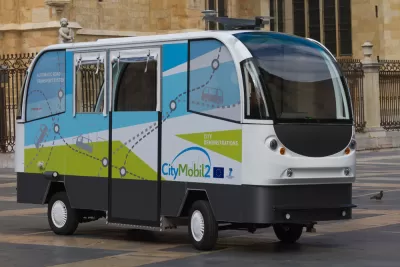Unlike the American focus on luxury personal self-drivers, the European approach favors small self-driving buses that can ferry riders to larger transit lines.

Transportation culture can be very different across the Atlantic, and that holds true when it comes to driverless vehicles. Unlike this country, where self-driving car developers focus on prestigious personal transport, the European focus is on augmenting well-developed transit systems that already exist.
Barely exceeding walking pace, many of these locally-developed vehicles fit into the self-driving bus category. They're designed to fill in that "first and last mile" between transit riders' homes and stations or stops.
Mark Scott writes, "Forgoing the latest automotive trends of aerodynamics and style, European transportation groups and city planners are instead aiming to connect these unglamorous driverless vehicles to existing public transportation networks of subways and buses."
"In total, more than 20 pilot or existing public transport programs have taken place in Europe involving autonomous vehicles [...] Most of these projects have received government funding, tapping into local research institutions and tech start-ups that are not household names."
FULL STORY: The Future of European Transit: Driverless and Utilitarian

Planetizen Federal Action Tracker
A weekly monitor of how Trump’s orders and actions are impacting planners and planning in America.

Congressman Proposes Bill to Rename DC Metro “Trump Train”
The Make Autorail Great Again Act would withhold federal funding to the system until the Washington Metropolitan Area Transit Authority (WMATA), rebrands as the Washington Metropolitan Authority for Greater Access (WMAGA).

The Simple Legislative Tool Transforming Vacant Downtowns
In California, Michigan and Georgia, an easy win is bringing dollars — and delight — back to city centers.

The States Losing Rural Delivery Rooms at an Alarming Pace
In some states, as few as 9% of rural hospitals still deliver babies. As a result, rising pre-term births, no adequate pre-term care and "harrowing" close calls are a growing reality.

The Small South Asian Republic Going all in on EVs
Thanks to one simple policy change less than five years ago, 65% of new cars in this Himalayan country are now electric.

DC Backpedals on Bike Lane Protection, Swaps Barriers for Paint
Citing aesthetic concerns, the city is removing the concrete barriers and flexposts that once separated Arizona Avenue cyclists from motor vehicles.
Urban Design for Planners 1: Software Tools
This six-course series explores essential urban design concepts using open source software and equips planners with the tools they need to participate fully in the urban design process.
Planning for Universal Design
Learn the tools for implementing Universal Design in planning regulations.
Smith Gee Studio
City of Charlotte
City of Camden Redevelopment Agency
City of Astoria
Transportation Research & Education Center (TREC) at Portland State University
US High Speed Rail Association
City of Camden Redevelopment Agency
Municipality of Princeton (NJ)



























